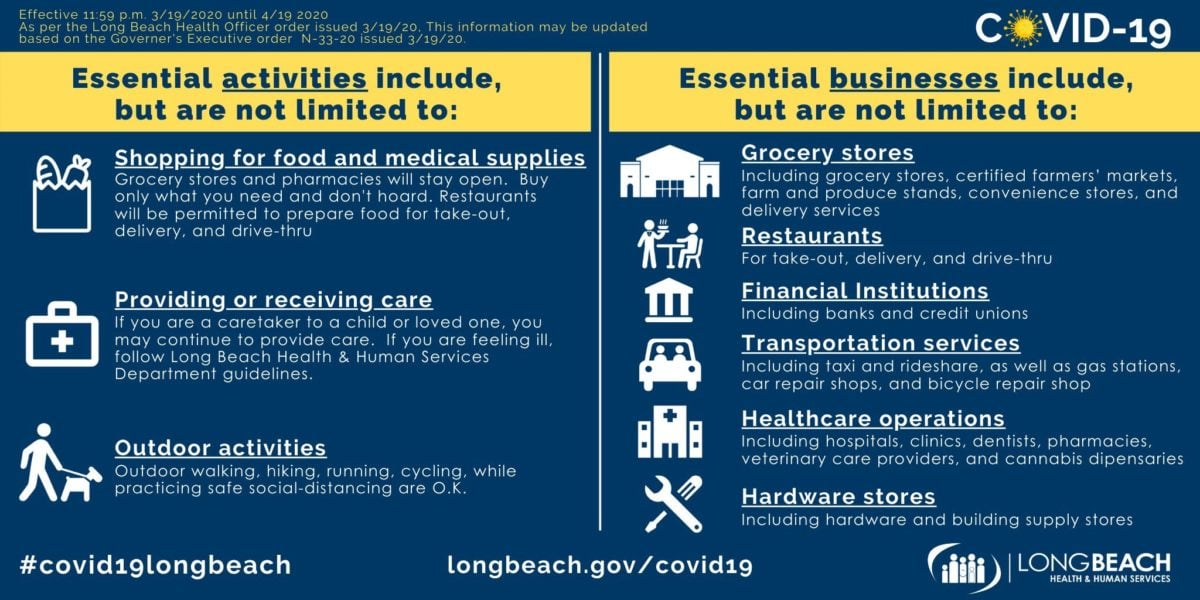 You can still walk the dog and go to the market. You also can take your car to the mechanic and pick up food as a to-go order from restaurants.
You can still walk the dog and go to the market. You also can take your car to the mechanic and pick up food as a to-go order from restaurants.
Trips to the pharmacy and hikes also are allowed, as long as social distancing is in place, meaning everyone keeps 6-feet apart from each other.
Los Angeles County and state officials on Thursday issued a “safer at home” order to help slow the spread of the novel coronavirus, COVID-19.
The order went into effect at midnight on Friday. Violating the order is a misdemeanor and punishable by fines or imprisonment.
Under the “safer at home” or stay home order, public and private gatherings of 10 or more people are banned.
Acceptable gatherings mean that people practice social distancing, standing 6 feet or more apart from each other. Also, a hand washing station or hand sanitizer must be on site, and a sign must be posted notifying people not to attend if they have a fever or cough.
Malls, shopping centers, playgrounds, and nonessential retail businesses are ordered closed until further notice.
Gyms, movie theaters, bars, clubs, and wineries were ordered closed last week.
“Essential businesses” are open.
Here’s a list of essential businesses.
- Grocery stores, certified farmers’ markets, food banks, convenience stores, pet supply stores, farm and produce stands
- Restaurants and beverage locations that prepare and serve food or beverages, but only for delivery, drive-through, or carry out
- Cannabis dispensaries with a medicinal cannabis license
- Newspapers, television, radio, magazine, podcast, and other media services
- Gas stations, auto-supply, auto-repair and car dealerships
- Banks and credit unions
- Hardware stores, garden nurseries, building supplies
- Childcare facilities providing services that help employees exempted to work. To the extent possible, these facilities must operate under the following mandatory conditions: (1) Childcare must be carried out in groups of 12 or less; (2) Children shall not change from one group to another; (3) If more than one group of children is cared for at one facility, each group shall be in a separate room. Groups shall not mix with each other; (4) Childcare providers shall remain solely with one group of children
- Hotels, motels, shared rental units, and similar spaces
- Food cultivation, including farming, livestock, and fishing
- Homeless shelters and social services for economically disadvantaged people
- Plumbers, electricians, exterminators, custodial-janitorial workers, handyman services, funeral home workers and morticians, moving services, HVAC installers, carpenters, landscapers, gardeners, property managers, private security personnel and other service providers who provide services to maintain the safety, sanitation, and essential operation to properties and other essential businesses.
- Mailing and shipping businesses, including post office boxes
- Educational institutions (including public and private K-12 schools, colleges, and universities) for purposes of facilitating distance learning or performing essential functions, provided that social distancing of 6-feet per person is maintained to the greatest extent possible.
- Laundromats, dry cleaners, and laundry service providers
- Businesses that supply office or computer products needed by people who work from home.
- Businesses that supply other essential businesses with the support or supplies necessary to operate.
- Businesses that ship, truck, provide logistical support or deliver groceries, food, goods or services directly to residences, essential businesses, healthcare operations, essential infrastructure.
- Airlines, taxis, and other private transportation providers providing transportation services necessary for activities of daily living.
- Home-based care for seniors, adults, people with a disability, or children.
- Residential facilities and shelters for seniors, adults, people with a disability, and children.
- Professional services, such as legal or accounting services, when necessary to assist in compliance with legally mandated activities.
- Military and defense contractors, federally funded research and development centers
- Any work deemed essential for national security including, but not limited to defense, intelligence and aerospace development and manufacturing for the Department of Defense, the intelligence community, and NASA and other federal government, and or United States Government departments and agencies.
